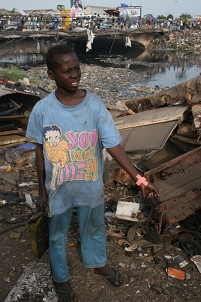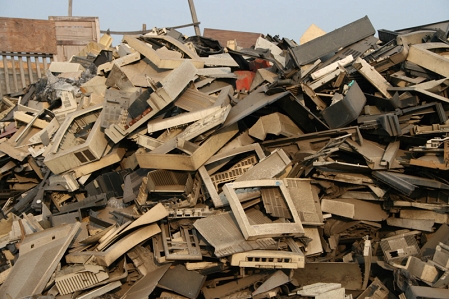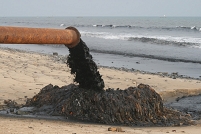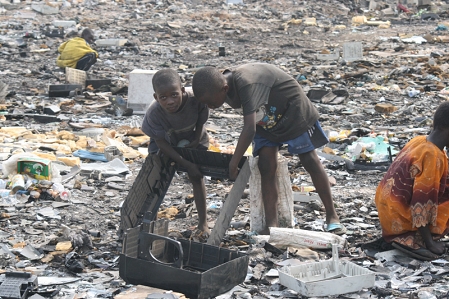Erstellt am: 19. 5. 2009 - 21:00 Uhr
The Hidden Toxic Flow
11-year old Emmanuel Osei works as a scrap collector in Ghana, scavenging metal from the corpses of Western computers, televisions and other end-of-life electronic products that have been dumped in West Africa. His goal is to salvage the odd gram of useful metals such as copper, which he can resell for a few cents. To isolate those metals he and his fellow rubbish-pickers have to burn away the useless plastics in the insulation tubes and circuit boards. Black clouds rise above the scrap heaps from the fires – a toxic mist that boys like Emmanuel constantly breathe in. Sometimes, to make the fires more effective, rubber car tyres are thrown on to the flames - adding some new ingredients to the toxic cocktail.

südwind
The work on the dumps is hard and unsophisticated. At Agbobloshie in Ghana’s capital, Accra, for example, old computer screens are smashed to pieces up by boys using rocks. The ground was a carpet of broken glass. The air stuck in your throat.
Campaigners warn that this is where your computer could end up if you don’t dispose of it properly. The trade is speeding up as we in the West continually upgrade our hardware. Hundreds of tons of E-waste is now said to be arriving in West Africa every month. A group from the Austrian NGO Südwind has been in West Africa to investigate the trade.

südwind
When the Austrian team met Emmanuel he was nursing a nasty gash on his wrist and was seemingly impervious to the dangers of tetanus. But other children had even more worrying ailments. They complained of constant headaches and there were stories of siblings and friends who no longer came to work because they had been coughing up blood.
No long term studies exist in Ghana to follow the ultimate consequences of working in this environment, but Südwind’s Christine Schröder points out that, besides the black clouds, the ground around the dumps has become soaked in astonishingly high concentrations of lead and mercury.
Lead is particularly dangerous for children as it effects the development of their brains. Mercury is destructive to the immune system, nervous system and skin.
Schröder's colleague and travelling partner Nora Holzmann reports seeing children with abnormal growths and rashes on their arms and faces. Scientists predict the fall-out must include ailments ranging from stunted growth and arrested mental development to cancer.
For the few cents that the rubbish- pickers earn, that seems like an awfully high price to pay.

südwind
It is partly the government of Ghana's responsibility to clean their own country up, of course - but they can't do it alone. The amount of scrap arriving from our shores is massive and in an environment of endemic poverty it is inevitable that often under-educated and hungry people will take on any form of money-making employment, regardless of the unpleasantness and long term risks involved.
That's why Südwind is putting the emphasis on reducung the toxic flow from Europe.
There are European and national regulations that should prevent our waste ending up in these electronic graveyards, yet it is proving all too easy for traders to find ways around them, selling on worn out electronic appliances as ’working goods’.
Südwind report that customs checks in several EU ports discovered falsely-labelled loads of E-waste. Meanwhile, although Austria carries out spot checks on exports of old electronic goods leaving the country, one of the traders that the Südwind team met boasted that he was imminently expecting a new delivery from this country.
The system is not ruled by cynicism alone of course. Africa has a thirst for cheap, second-hand electronic goods as it attempts to bridge the infamous digital divide. Some computers arriving in Ghana do still work and are put to good use, but a shocking majority go straight from the boats at Tema port to the dumps.
But legal experts in Africa have asked for a European mechanism that would only allow us to send tested and certified computers that can actually offer some useful life.

südwind
Südwind’s Nora Holzmann hopes that, with the help of public pressure, these loopholes will be closed soon, but also points to ways that we the consumers can help prevent this situation. She recommends that consumers take their old electronic wares to official public collection points designed specifically for the purpose - and under no circumstances to pass them on to private waste traders. She also says you can take them to special "ReUse" centres in Austria, which guarantee that they will be properly repaired and used again.


